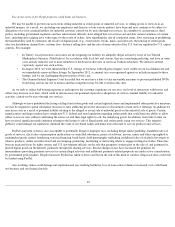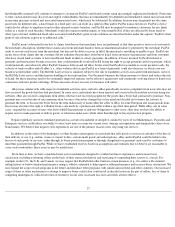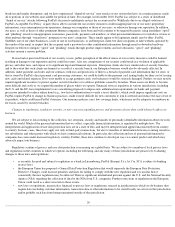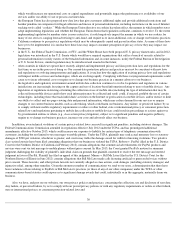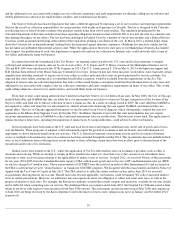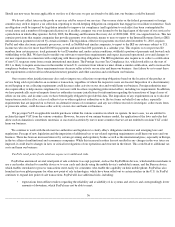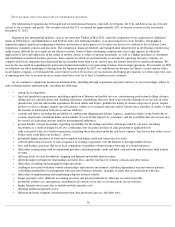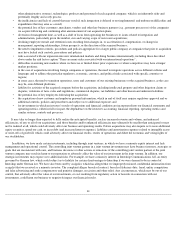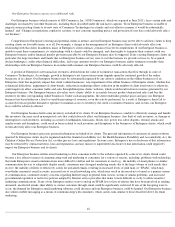eBay 2013 Annual Report Download - page 34
Download and view the complete annual report
Please find page 34 of the 2013 eBay annual report below. You can navigate through the pages in the report by either clicking on the pages listed below, or by using the keyword search tool below to find specific information within the annual report.
among Bill Me Later users may increase due to, among other things, changes to underwriting standards by Bill Me Later and the financial
institutions issuing the Bill Me Later credit products, worsening economic conditions, such as a recession or greater austerity in the U.S., and
high unemployment rates. Consumers who miss payments on their obligations often fail to repay them, and consumers who file for protection
under the bankruptcy laws generally do not repay their credit.
PayPal has also begun a pilot program, working with WebBank, for WebBank to offer working capital financing to selected sellers in the
U.S., and for PayPal to purchase the related receivables. This program is still in the pilot phase; however, if expanded, it would present risks
similar to those discussed above associated with the Bill Me Later service.
We purchase receivables related to Bill Me Later accounts through borrowings and domestic and international cash resources. If we are
unable to fund our purchase of receivables related to the Bill Me Later business adequately or in a cost-effective manner, the growth and
profitability of this business would be significantly and adversely affected.
Additionally, in providing the Bill Me Later service and other similar programs in the future, we face other risks similar to those faced by
PayPal described elsewhere in these Risk Factors, including under the captions “Government inquiries may lead to charges or penalties,” “Our
Payments business is subject to a number of laws and regulations, including those governing banking, money transmission, and payment services
that vary in the markets where we operate,” and “Our Payments business is subject to consumer protection laws and regulations.”
Our revenue from advertising is subject to factors beyond our control.
We derive significant revenue from advertising on our websites and applications. Revenues from online advertising are sensitive to events
and trends that affect advertising expenditures, such as general changes in the economy and changes in consumer spending, the effectiveness of
online advertising versus offline advertising media and the value our websites provide to advertisers relative to other websites. The economic
downturn adversely impacted our advertising revenue. In addition, major search engine operators (e.g., Google) have the ability to change from
time to time, at their sole discretion, the rules and search algorithms governing the pricing, availability and placement of online advertising, and
do so periodically. For example, changes by Google since October 2012 have significantly reduced the amount of traffic our Marketplaces
business receives from free search on Google. Any further changes in these rules or search algorithms could materially reduce the value that we
derive from online advertising on our websites, either directly or indirectly. For example, retailers pay a fee to us for online shoppers directed to
their websites by the eBay Commerce Network, which consists of the Shopping.com websites and their distribution network. Rule changes made
by search engines beginning in 2008 disrupted traffic to our Shopping.com websites, which in turn adversely affected click-through traffic to
retailers from our Shopping.com websites and associated fee revenue. In addition, legislators and regulators in various jurisdictions, including
the U.S. and the European Union, are reviewing Internet advertising models and the use of user-related data, including location-based
information relating to users of mobile devices, and are considering proposals that could restrict or otherwise impact these business models and
practices. If we experience a reduction in our advertising revenues due to economic, competitive, regulatory, technological or other factors, the
renegotiation of our contracts with major advertising companies on unfavorable terms, or a reduction in our ability to effectively place
advertisements on our websites, or are otherwise unable to provide value to our advertisers, our business and financial results would suffer.
Our growth will depend on our ability to develop our brands, and these efforts may be costly.
We believe that continuing to strengthen our brands will be critical to achieving widespread acceptance of our services, and will require a
continued focus on active marketing efforts across all of our brands. We will need to continue to spend substantial amounts of money on, and
devote substantial resources to, advertising, marketing, and other efforts to create and maintain brand loyalty among users. Since 2005, we have
significantly increased the number of brands we are supporting, adding our classified websites (including Den Blå Avis, BilBasen, eBay
Classifieds (including eBay Anuncios, eBay Kleinanzeigen and eBay Annunci), GittiGidiyor, Gumtree, Kijiji, LoQUo, Marktplaats.nl,
mobile.de, alaMaula and 2dehands.be), StubHub, Bill Me Later, Gmarket, Milo, WHERE, RedLaser, Enterprise and eBay Now, among others.
Each of these brands requires its own resources, increasing the costs of our branding efforts. Brand promotion activities may not yield increased
revenues, and even if they do, any increased revenues may not offset the expenses incurred in building our brands. Also, major search engine
operators that we use to advertise our brands have frequently changing rules that govern the pricing, availability and placement of online
advertisements (e.g., paid search, keywords), and changes to these rules could require us to increase our spending on online advertisements and
adversely affect our ability to use online advertising to promote our brands in a cost-effective manner. If we fail to promote and maintain our
brands, or if we incur substantial expenses in an unsuccessful attempt to promote and maintain our brands, our business and financial results
would suffer.
32



